This has been a bumper few months for string quartet CDs, with some outstanding issues from several world-class ensembles.
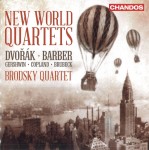 Britain’s Brodsky Quartet adds another winner to its already extensive discography with New World Quartets (Chandos CHAN 10801). The main works on the disc are Dvořák’s String Quartet Op.96 (“American”) and Samuel Barber’s String Quartet Op.11, best known for its slow movement that later became his Adagio for Strings; it remains extremely effective in its original version. The shorter works are Gershwin’s Lullaby, Copland’s Two Pieces and the Hoe-Down from Rodeo (here in a transcription by two of the Brodsky members) and Dave Brubeck’s Regret, a hauntingly beautiful piece presented here in an arrangement that the classically trained Brubeck prepared specifically for the Brodsky Quartet.
Britain’s Brodsky Quartet adds another winner to its already extensive discography with New World Quartets (Chandos CHAN 10801). The main works on the disc are Dvořák’s String Quartet Op.96 (“American”) and Samuel Barber’s String Quartet Op.11, best known for its slow movement that later became his Adagio for Strings; it remains extremely effective in its original version. The shorter works are Gershwin’s Lullaby, Copland’s Two Pieces and the Hoe-Down from Rodeo (here in a transcription by two of the Brodsky members) and Dave Brubeck’s Regret, a hauntingly beautiful piece presented here in an arrangement that the classically trained Brubeck prepared specifically for the Brodsky Quartet.
Everything on this CD simply glows: the playing is warm, radiant and expressive, and the balance and sound quality are ideal.
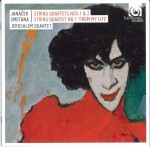 The latest CD from the Jerusalem Quartet celebrates the Czech national school, with the first – and best known – of Bedřich Smetana’s two quartets, the String Quartet in E minor “From My Life,” and both quartets by his spiritual heir Leoš Janáček (harmonia mundi HMC 902178).
The latest CD from the Jerusalem Quartet celebrates the Czech national school, with the first – and best known – of Bedřich Smetana’s two quartets, the String Quartet in E minor “From My Life,” and both quartets by his spiritual heir Leoš Janáček (harmonia mundi HMC 902178).
The players take a thoughtful, carefully measured approach to the Smetana, with a steady underlying rhythm and a wide range of dynamics. Overall, though, the result seems more controlled than rhapsodic; there’s no real outburst of joy and exhilaration at the start of the second movement, and little sense of desolation at the end of the finale.
The two Janáček quartets, however – subtitled the “Kreutzer Sonata” and “Intimate Pages” – are worth the price of the CD on their own, the Jerusalem Quartet capturing the wide emotional range and almost improvisatory rhythms of this astonishingly personal and achingly beautiful music in stunning performances.
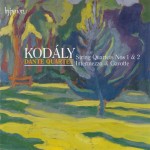 Another British ensemble, the Dante Quartet, is now approaching its 20th year. Their latest CD on the Hyperion label is devoted to the music of the Hungarian composer Zoltán Kodály, and features the String Quartets Nos.1 & 2 and the Intermezzo for String Trio, all three works dating from the first 18 years of the 20th century (CDA67999). The very short Gavotte from 1952 completes the CD.
Another British ensemble, the Dante Quartet, is now approaching its 20th year. Their latest CD on the Hyperion label is devoted to the music of the Hungarian composer Zoltán Kodály, and features the String Quartets Nos.1 & 2 and the Intermezzo for String Trio, all three works dating from the first 18 years of the 20th century (CDA67999). The very short Gavotte from 1952 completes the CD.
The quartets in particular are wonderful works, and the Dante Quartet displays a really terrific feel for this music in highly idiomatic performances.
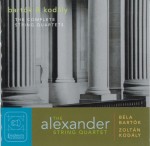 The excellent booklet notes for the Dante CD stress the close relationship between Kodály and his friend and compatriot Béla Bartók, and the Alexander String Quartet take things to the logical conclusion with their 3-CD set of the Complete String Quartets of Bartók and Kodály (Foghorn Classics CD2009).
The excellent booklet notes for the Dante CD stress the close relationship between Kodály and his friend and compatriot Béla Bartók, and the Alexander String Quartet take things to the logical conclusion with their 3-CD set of the Complete String Quartets of Bartók and Kodály (Foghorn Classics CD2009).
Again, the Kodály works receive outstanding performances, with possibly even more depth in the slow movements than in the Dante recording.
The Bartók quartets are of an equally high standard, with a refined and polished feel to them, although the tougher, abrasive moments never lose their edge. All in all, a marvellous set, especially at the mid-range price.
I’ve probably received half a dozen different 2-CD sets of the Bach Suites for Solo Cello over the past three or four years, and I always find them difficult to review. It’s not simply the sheer amount of music and its emotional and intellectual range and depth, but the almost limitless possibilities for phrasing, bowing, interpretation, ornamentation, tempo choice, style, tone and vibrato use available to the soloist. No two sets are ever the same, and there are so many available that to try comparison reviews would be almost impossible. All you can really do is give prospective listeners some idea of what to expect. After that, it just comes down to personal taste.
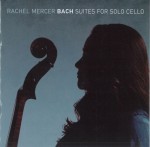 Rachel Mercer’s new release on the Pipistrelle label (PIP1403) is her September 2011 recording from Walter Hall of the Suites on the 1696 Bonjour Stradivarius cello, which was on loan to her from the Canada Council from 2009 to 2012. Mercer felt an immediate affinity with the instrument, and began performing the Suites on it as often as possible. It certainly has a big, strong sound, with a good deal of bite that sounds almost rough in places. Mercer’s approach is quite slow and introspective, although the dance movements have a nice line, and it’s clearly a very personal journey for her.
Rachel Mercer’s new release on the Pipistrelle label (PIP1403) is her September 2011 recording from Walter Hall of the Suites on the 1696 Bonjour Stradivarius cello, which was on loan to her from the Canada Council from 2009 to 2012. Mercer felt an immediate affinity with the instrument, and began performing the Suites on it as often as possible. It certainly has a big, strong sound, with a good deal of bite that sounds almost rough in places. Mercer’s approach is quite slow and introspective, although the dance movements have a nice line, and it’s clearly a very personal journey for her.
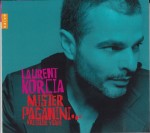 The French violinist Laurent Korcia is in terrific form on Mister Paganini, his latest CD on the naïve label (V 5344). It features transcriptions by Fritz Kreisler and Eugène Ysaÿe that were inspired by Paganini. Korcia is joined by the Orchestre de chamber de Paris under Jean-Jacques Kantorow for the opening and closing tracks: Kreisler’s Concerto in One Movement transcribed from the first movement of Paganini’s Concerto No.1 in D Major; and Paganini’s own I palpiti Op.13, the Introduction and Variations on the aria di tanti palpiti from Rossini’s opera Tancredi. Pianist Haruko Ueda joins Korcia for the remaining tracks on the disc, apart from one piano solo – Kreisler’s lovely Petite Valse.
The French violinist Laurent Korcia is in terrific form on Mister Paganini, his latest CD on the naïve label (V 5344). It features transcriptions by Fritz Kreisler and Eugène Ysaÿe that were inspired by Paganini. Korcia is joined by the Orchestre de chamber de Paris under Jean-Jacques Kantorow for the opening and closing tracks: Kreisler’s Concerto in One Movement transcribed from the first movement of Paganini’s Concerto No.1 in D Major; and Paganini’s own I palpiti Op.13, the Introduction and Variations on the aria di tanti palpiti from Rossini’s opera Tancredi. Pianist Haruko Ueda joins Korcia for the remaining tracks on the disc, apart from one piano solo – Kreisler’s lovely Petite Valse.
There are real fireworks in the Kreisler concerto, particularly in the cadenza, terrific dynamics in the Albéniz-Kreisler Malagueña, and a real gypsy feel in Kreisler’s La gitana. Kreisler was justifiably famous for the accuracy of his double-stopping, and Korcia is superb in this respect in all the Kreisler transcriptions, and in particular in La campanella, Kreisler’s transcription of the finale of Paganini’s Concerto No.2 in B Minor.
Ysaÿe is represented by his Paganini Variations, a set of 15 short variations on Paganini’s famous 24th Caprice. This is apparently the first recording of the work.
Korcia has a huge tone, especially in the lower register, and always lets his technical brilliance serve the music and not overpower it. Some astonishing playing in I palpiti brings an outstanding CD to a rousing close.
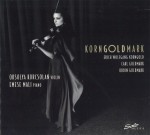 The Hungarian violinist Orsolya Korcsolan, now resident in Vienna after studying with Dorothy DeLay and Itzhak Perlman at the Juilliard School in New York, returns to her Hungarian Jewish roots on the CD KornGOLDMark on the German label Solo Musica (SM 202). She is joined by pianist Emese Mali in a recital of works by Erich Wolfgang Korngold, Carl Goldmark and Rubin Goldmark, each of whom spent a significant part of his life in Vienna.
The Hungarian violinist Orsolya Korcsolan, now resident in Vienna after studying with Dorothy DeLay and Itzhak Perlman at the Juilliard School in New York, returns to her Hungarian Jewish roots on the CD KornGOLDMark on the German label Solo Musica (SM 202). She is joined by pianist Emese Mali in a recital of works by Erich Wolfgang Korngold, Carl Goldmark and Rubin Goldmark, each of whom spent a significant part of his life in Vienna.
Korcsolan’s playing is strong and confident, with a really big tone, but some of the music here doesn’t seem to give her much opportunity to display her undoubted musicality; the short Korngold pieces in particular are pretty straightforward. Korngold was a child prodigy, and his Serenade from the ballet Der Schneemann was written when he was only 11. There are also three arias from his operas, the best-known being Marietta’s Lied from Die Tote Stadt, and the four-movement Much Ado About Nothing Suite, Op.11, arranged by the composer from his orchestral incidental music for a 1920 production of the Shakespeare play.
There is certainly more substance to Carl Goldmark’s Suite Op.11 in E Major, and to the lovely Romanze in A Major, Op.51, and Korcsolan makes the most of the opportunity to shine.
Rubin Goldmark was Carl’s nephew; although he studied in Vienna, he was born in New York, and spent his entire teaching career in the United States, ending up as head of composition at the new Juilliard School in 1924. He is represented here by the world premiere recording of his Plaintive Air, a short but very effective piece.
Korcsolan ends the CD with a bonus track that she admits doesn’t really fit with the program, although she does feel that there are links (she doesn’t elaborate) with the other three composers. Robert Dauber wrote his Serenata in 1942 in the Theresienstadt concentration camp; he died in Dachau in 1945. It is his only surviving composition, and is a short, delicate Kreisler-like work that bears little hint of the circumstances of its composition. Korcsolan says that of all the works on the CD it is probably the one closest to her heart, and it shows in her performance. It’s arguably the most satisfying track on the CD.
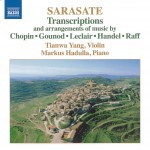 The excellent 8-volume Naxos series of the complete violin music of Pablo Sarasate reaches completion with the issue of Volume 4 of the Music for Violin and Piano – Transcriptions and Arrangements (8.572709). Violinist Tianwa Yang has been in tremendous form throughout the series, and displays the same warmth, dazzling technique and interpretative skills that marked the earlier volumes. German pianist Markus Hadulla provides excellent accompaniment in short pieces by Moszkowski, Chopin, Handel and Bach, and by the French Baroque violinists Jean-Pierre Guignon, Jean-Joseph de Mondonville, Jean-Marie Leclair and Jean-Baptiste Senaillé. The two more substantial works on the CD are Sarasate’s own Souvenirs de Faust on themes from the Gounod opera, and Joachim Raff’s exceptionally difficult La fée d’amour, which was apparently Sarasate’s favourite concert item. Needless to say, Yang seems to navigate the challenges with effortless ease.
The excellent 8-volume Naxos series of the complete violin music of Pablo Sarasate reaches completion with the issue of Volume 4 of the Music for Violin and Piano – Transcriptions and Arrangements (8.572709). Violinist Tianwa Yang has been in tremendous form throughout the series, and displays the same warmth, dazzling technique and interpretative skills that marked the earlier volumes. German pianist Markus Hadulla provides excellent accompaniment in short pieces by Moszkowski, Chopin, Handel and Bach, and by the French Baroque violinists Jean-Pierre Guignon, Jean-Joseph de Mondonville, Jean-Marie Leclair and Jean-Baptiste Senaillé. The two more substantial works on the CD are Sarasate’s own Souvenirs de Faust on themes from the Gounod opera, and Joachim Raff’s exceptionally difficult La fée d’amour, which was apparently Sarasate’s favourite concert item. Needless to say, Yang seems to navigate the challenges with effortless ease.
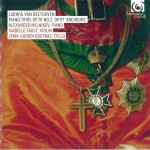 There’s an all-star line-up for the Beethoven Piano Trios Op.70 No.2 and Op.97, The Archduke, on the harmonia mundi label (HMC 902125), with pianist Alexander Melnikov joining violinist Isabelle Faust and Jean-Guihen Queyras cellist in the composer’s last two works in the genre. Melnikov plays a restored 1828 fortepiano, so the sound and approach are softer and more intimate than in performances with a modern grand piano. These are committed and thoughtful interpretations, though, and no less powerful for the somewhat reduced dynamic range in the keyboard.
There’s an all-star line-up for the Beethoven Piano Trios Op.70 No.2 and Op.97, The Archduke, on the harmonia mundi label (HMC 902125), with pianist Alexander Melnikov joining violinist Isabelle Faust and Jean-Guihen Queyras cellist in the composer’s last two works in the genre. Melnikov plays a restored 1828 fortepiano, so the sound and approach are softer and more intimate than in performances with a modern grand piano. These are committed and thoughtful interpretations, though, and no less powerful for the somewhat reduced dynamic range in the keyboard.
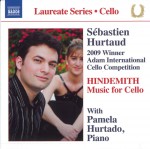 The French cellist Sébastien Hurtaud, winner of the 2009 Adam International Cello Competition, is featured in a recital of Hindemith’s Music for Cello with pianist in the Naxos Laureate Series (8.573172). The Three Pieces for Cello and Piano Op.8 seem a bit uneven in places, with the piano quite dominant at times, but A frog he went a-courting – Variations on an Old English Nursery Song fares much better. Hurtaud is terrific in the Sonata for Solo Cello, Op.25 No.3, and is joined by Hurtado again for the Sonata for Cello and Piano from 1948.
The French cellist Sébastien Hurtaud, winner of the 2009 Adam International Cello Competition, is featured in a recital of Hindemith’s Music for Cello with pianist in the Naxos Laureate Series (8.573172). The Three Pieces for Cello and Piano Op.8 seem a bit uneven in places, with the piano quite dominant at times, but A frog he went a-courting – Variations on an Old English Nursery Song fares much better. Hurtaud is terrific in the Sonata for Solo Cello, Op.25 No.3, and is joined by Hurtado again for the Sonata for Cello and Piano from 1948.



